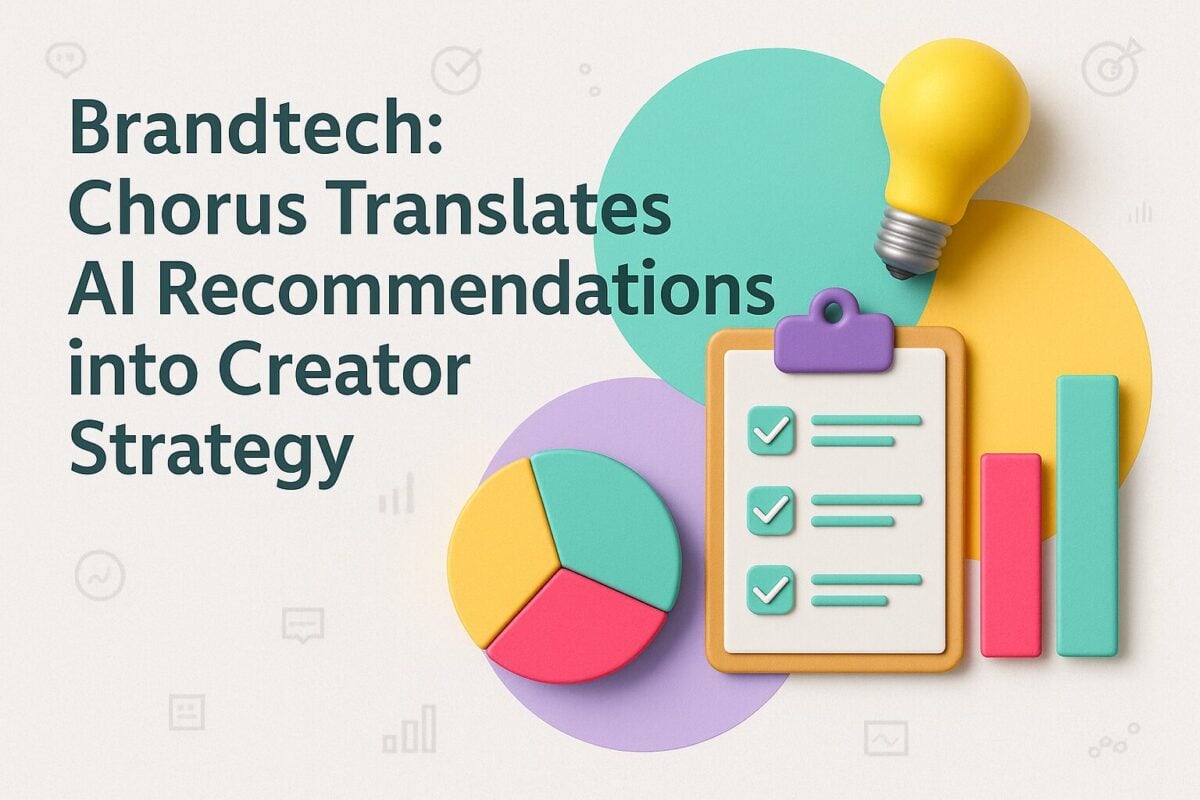Artificial Intelligence (AI) has been a buzzword for quite some time, but its real potential is only now being realized in marketing automation. AI-powered marketing automation has revolutionized the way businesses interact with their customers, allowing marketers to deliver personalized experiences at scale.
Due to its extensive adoption, revenue from AI software is expected to reach $126 billion by 2024. Among other technologies, machine learning, which is a subset of AI, is expected to have the highest growth rate in the marketing sector.
While most people know AI for its content creation potential in marketing, the technology's use cases are far more extensive. AI can help with lead scoring, audience segmentation, messaging personalization, campaign optimization, customer service, and predictive analysis.
The more you know about AI marketing automation, the better equipped you will be to incorporate it into your marketing strategy. That's why we've put together a guide to help you understand the ins and outs of AI-powered marketing automation.
- How Does AI Differ From Automation?
- What Is the Role of AI in Marketing Automation?
- Why Should Marketers Use AI Marketing Automation?
- What Are the Applications of AI in Marketing Automation?
- How to Implement AI Marketing Automation?
- What Are the Emerging Trends and Advancements in AI Marketing Automation?
- Conclusion
- Frequently Asked Questions
How Does AI Differ From Automation?
Although AI and automation are often used interchangeably, they are two distinct technologies. However, they can be used in combination in a use case like marketing to deliver superb results.
Automation simply means using technology to automate repetitive tasks or processes. A simple example of automation in marketing might be scheduling social media posts or sending out email campaigns at specific times.
The key here is that someone has already created the social media posts or written the emails. Your automation software is simply publishing or sending them at a designated time so that you don't have to do it yourself.
On the other hand, AI helps with the writing and creation of content itself. Unlike automation, which follows pre-programmed rules and instructions, AI can learn and adapt on its own.
For example, if you ask ChatGPT to write an email subject line to announce your upcoming Back-to-School sale, it will generate multiple options for you. An automation tool won't do that. It will, however, schedule the email to be sent at a specific time.

ChatGPT email subject line generation
In other words, AI requires processing vast amounts of data and training to augment human intelligence, while automation uses technology to replace human intervention. Automation may or may not use AI technology to perform tasks, while AI technology always involves automation to some extent.
So, how do these two work together in AI marketing automation?
We'll explain this using the same email marketing example. Mailchimp is a popular email marketing tool that lets you create customized automation for your campaigns. The software has recently introduced AI features, such as email generation, to combine the power of automation and AI.
Suppose you want to write the email for your Back-to-School campaign. You can ask Mailchimp's Email Content Generator to write it. The tool will provide three options for you to choose from. This is the AI part.
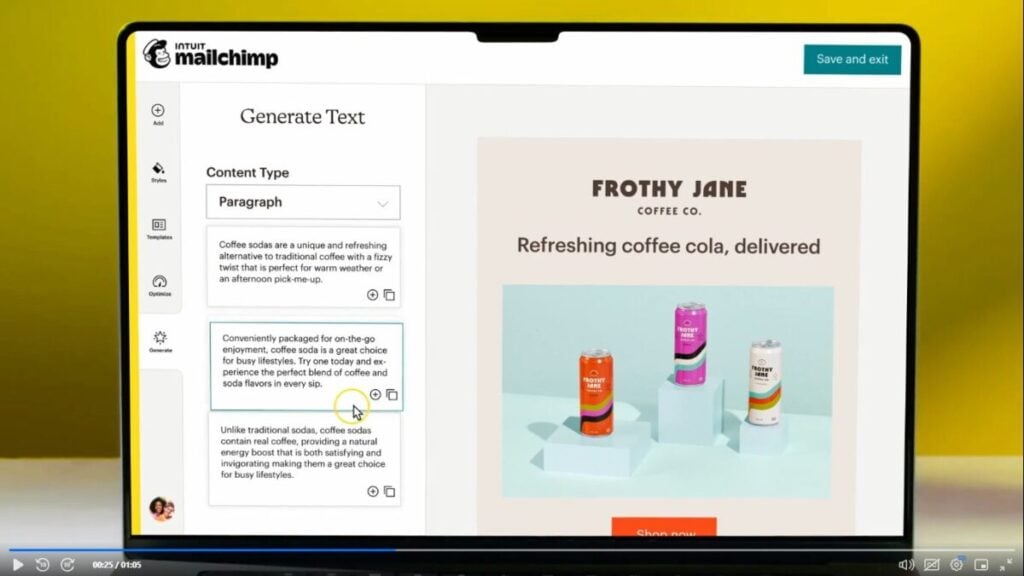
Next, you can set up an automation that will send the email to your subscribers at 3 pm on the day before your Back-to-School sale. This is the automation part.
Just like this, marketers can use the blend of AI and automation in their strategies. The possibilities range from email marketing and social media content creation to personalized ad targeting and customer service chatbots.
What Is the Role of AI in Marketing Automation?
At its most basic level, AI is a computer program that is designed to learn from data and adapt its behavior accordingly. In the context of marketing automation, this means that AI can analyze vast amounts of data to identify patterns, predict customer behavior, and make decisions in real time.
Besides pattern recognition, AI also improves SEO and content quality. In a Semrush report, 65% of marketers said that their SEO has improved due to AI, while 68% of businesses reported better content marketing ROI.
AI also allows for dynamic personalization; it can adjust the content and messaging based on individual customer preferences and behaviors. Segment's personalization report found that 70% of brands agree that the adoption of AI will change personalization and other marketing strategies.

In the same report, 58% of business leaders said that AI chatbots will be the most impactful form of AI personalization in the next five years. If that tells us anything, it's that the role of AI in marketing automation will only continue to grow in the future.
All in all, the integration of AI in marketing automation brings many benefits, promoting more and more marketers to invest in this technology.
Why Should Marketers Use AI Marketing Automation?
There are many reasons for marketers to use AI marketing automation. While some are monetarily motivated, others are more focused on efficiency and customer satisfaction. Let's look at some of them.

Benefits of AI marketing automation
Better Personalization
We live in a world where every customer wants to be treated as an individual, not just another number in a database. AI marketing automation allows for dynamic personalization, providing a specialized experience for each customer based on their unique preferences and needs.
When brands provide personalized services to customers, they can expect better retention and revenue. McKinsey reports that fast-growing companies get 40% more of their business revenue from personalization compared to slower-growing companies.
It doesn't end there. The report also shows that 71% of customers want to have personalized experiences with brands. More importantly, 76% of customers get frustrated in the absence of personalization.
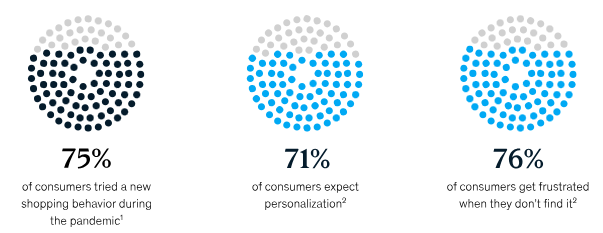
AI marketing automation ensures your customers don't end up in this category.
For example, Netflix uses AI algorithms to recommend content to its users based on their viewing history, leading to higher engagement and retention rates.
Cost Efficiency
By automating repetitive tasks, AI can help marketers save time and money. For example, AI-powered chatbots can handle customer inquiries and provide 24/7 support, reducing the need for human customer service agents.
In addition, AI can help optimize advertising spend by identifying which channels and campaigns are most effective, reducing wasted ad spend.
The extent of cost savings ultimately depends on the specific AI marketing use cases and the industry where they are implemented. For example, in healthcare, AI could save the industry $360 billion per year.
Optimization of ROI
The good news is that AI doesn't only save money but also provides positive ROI. In a HubSpot survey, 44% of business leaders said that their investment in AI and automation tools has a somewhat positive ROI. Similarly, 27% said that the ROI is very positive, and only 9% reported it to be very negative.
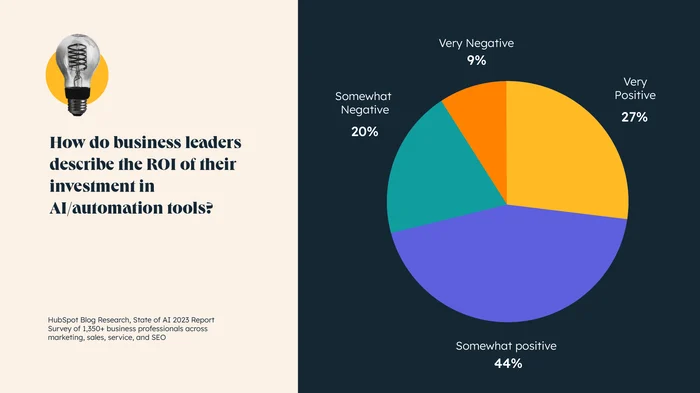
The trend has been consistent since 2022 when McKinsey reported that 63% of the companies it surveyed saw at least a 5% increase in annual revenue due to AI adoption. Not only that, AI also reduced costs for the respondents, 32% of which said that AI had reduced their operational costs by 20%.
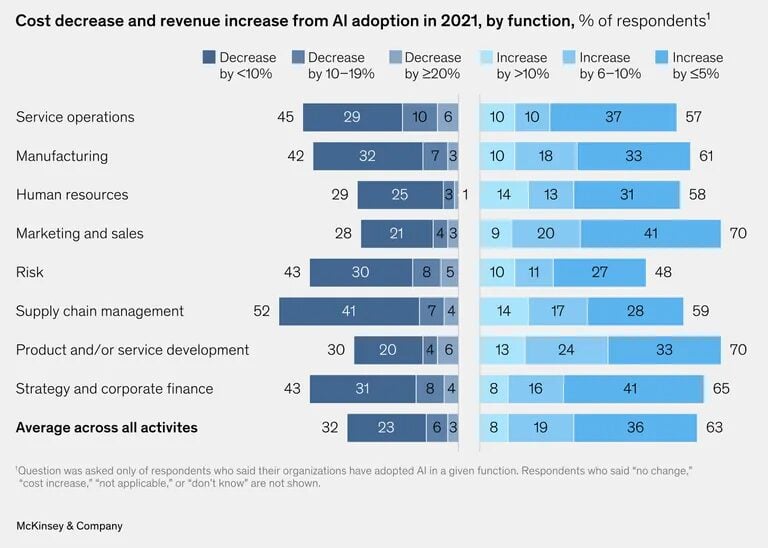
Predictive Analysis
With the pace at which the world is changing and new businesses are emerging, existing businesses have to keep the future in mind for all their present marketing strategies.
For example, how are your audience's interests expected to change in the next few months? What are the upcoming trends that your marketing team should be aware of?
AI plays a role in predictive analysis by analyzing large amounts of data and providing useful insights on future trends. For example, Amazon uses AI to make product recommendations to its customers based on their purchase history and browsing behavior. Since the AI knows a customer has previously bought an outdoor tent, it can recommend camping accessories like sleeping bags and fishing gear.
What Are the Applications of AI in Marketing Automation?
We've already touched on some applications of AI marketing automation. Let's discuss them in detail with some tools you can use to implement them.
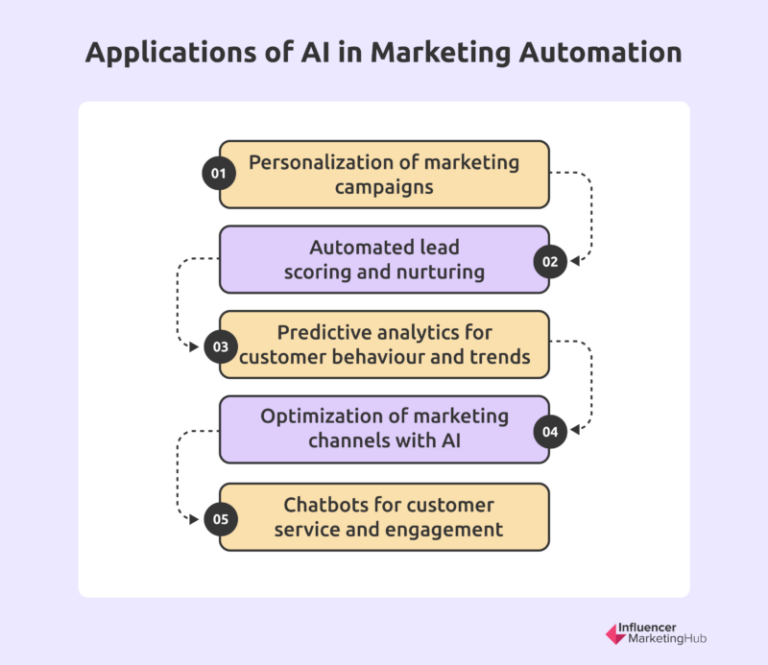
Applications of AI in marketing automation
Personalization of Marketing Campaigns
McKinsey's Next in Personalization report states,
"Consumers don't just want personalization; they demand it. With store and product loyalty more elusive, getting it right matters."
So, how do you get it right? With AI.
Stephanie Chevalier, a Statista analyst, explains it quite simply,
"Through algorithms, artificial intelligence can predict a customer's probable product choices based on personal data, like browsing history and past purchases."
That's exactly what most websites, such as Amazon, do. Their AI algorithms collect data, analyze it, and then make product recommendations. For example, we searched for a gaming desk on Amazon and came across the one from Little Tree Store.
Since it's a gaming desk, Amazon's algorithm recommended a gaming monitor to go along with it. That's AI in action.

It sees what we're interested in and then suggests products that go well with our interests or past purchases. Instead of suggesting random items that the buyer wouldn't need, AI personalizes the shopping experience, eventually resulting in a larger order size and happier customers.
A common concern many marketers have in this regard is the customers' reluctance to share data. After all, if there's no data, the AI algorithms can't personalize interactions.
However, according to an Accenture study, 92% of customers who are interested in personalized products are willing to share their data. With customers on board, personalization becomes even more manageable.
Tool Suggestion:
Dynamic Yield is an excellent personalization software that uses AI and propensity models to create personalized experiences for customers. Since it shows the most relevant content to each customer, allows personalized promotional messaging, and streamlines product discovery, it ultimately personalizes the customer journey, resulting in a higher likelihood of a purchase.
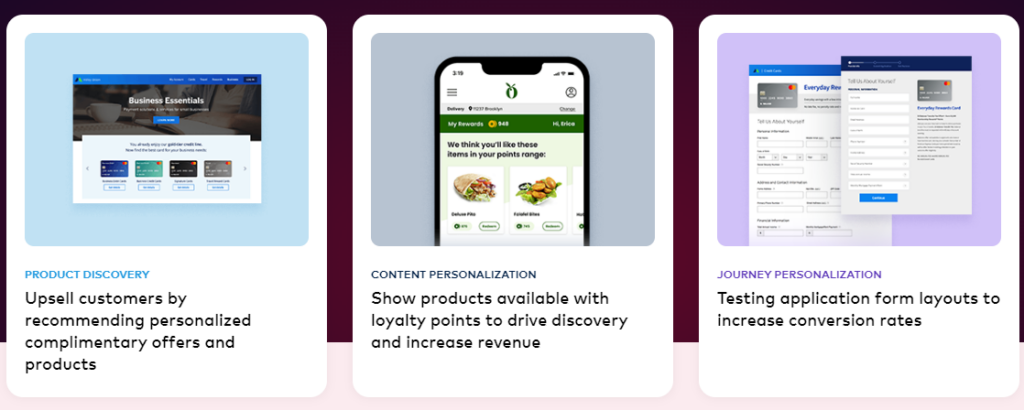
Automated Lead Scoring and Nurturing
Lead scoring and nurturing can be a time-consuming process, but AI can automate it by analyzing data on leads to identify which prospects are most likely to become customers.
Automated nurturing can also result in higher conversion rates, as leads are effectively guided through the sales funnel until they are ready to make a purchase.
For example, if a lead has shown interest in a particular product, AI can automatically send targeted content and offers related to that product, increasing the chances of conversion.
In a HubSpot survey, 85% of salespeople using AI and automation said that it makes their prospecting efforts more effective. Similarly, 79% said that AI saves them time. So, AI doesn’t only help automate lead scoring, but also makes it less time-intensive.
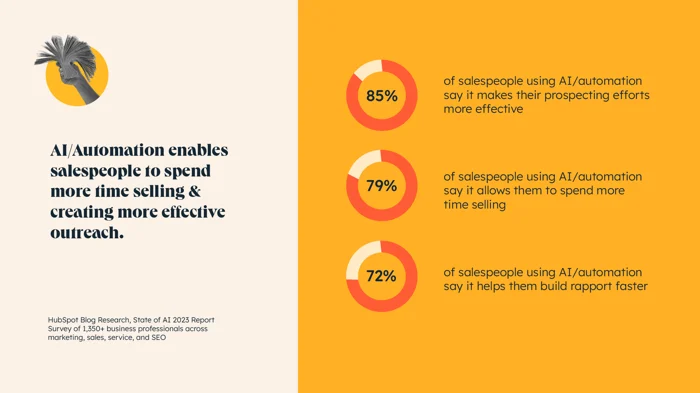
Tool Suggestion:
Copilot AI is a sales enablement tool that converts high-quality LinkedIn prospects by automating your outreach. You can use it to send one-click personalized messages to your prospects and prioritize your engagement based on intent to maximize the chances of success.

Predictive Analysis for Customer Behavior and Trends
Predictive analytics using AI can help marketers anticipate customer behavior and trends before they happen. By analyzing data on past customer behaviors, AI algorithms can make predictions about future behaviors, allowing marketers to adjust their strategies accordingly.
For instance, businesses can use predictive analytics to determine the best time to launch a new product or service based on historical data. It's due to the increasing demand for predictive AI tools that this market is forecasted to be valued at $108 billion by 2033.

In the same report, it was found that sales and marketing are the leading application areas for predictive AI software, holding 21% of the market share. Since large enterprises have the resources to deploy predictive AI tools, they hold more than 65% of the market share in this space.
However, that doesn't mean smaller businesses cannot take advantage of predictive AI. There are many affordable and user-friendly tools available that cater to the needs of small and medium-sized businesses.
These tools can help businesses identify potential customers, anticipate their needs, and personalize their marketing efforts, leading to higher conversion rates and customer retention.
Tool Suggestion:
Plat AI markets itself as a "real-time decision-making engine" that allows businesses to build predictive AI models for their use cases without any coding experience. Marketers can simply define their objective, upload the data, select a target, and generate the model. The AI tools will then provide insights and make predictions based on the given objectives.

Optimization of Marketing Channels With AI
By analyzing data on the performance of different marketing channels, AI algorithms can identify which channels are most effective and can allocate resources accordingly.
Let's say you market your business on Instagram and X. You want to know which of the two you should invest more time and money on, but you don't have the resources to test both channels extensively. AI can provide deep insights into the performance of each channel and identify which one is generating more conversations and revenue.
Similarly, if you want to run Instagram ads but you're not sure of the right placement or copy, you can use AI. Google has dedicated AI tools for paid ads optimization, which can analyze and recommend the best placement, targeting, and copy for maximum ROI.
Tool Suggestion:
Polymer is a data analysis and optimization tool that creates tables and visuals of your data that you can then use to make decisions. You can even ask questions in plain English and get insights based on your data.
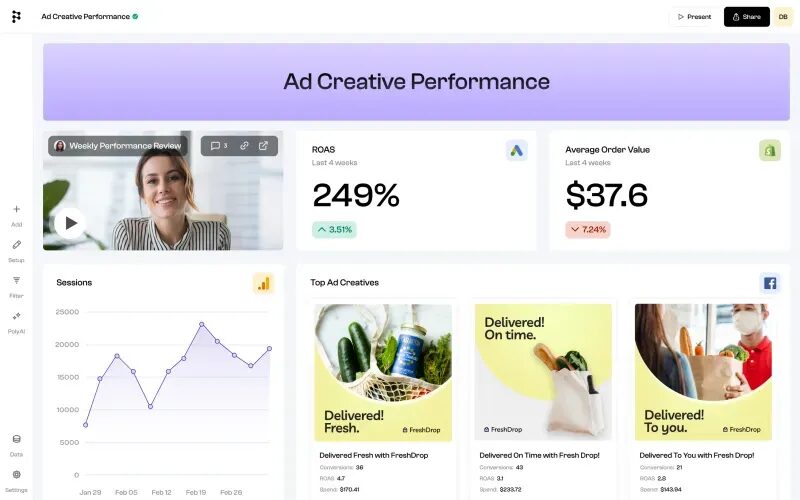
Chatbots for Customer Service
Chatbots have proven to be quite successful in terms of customer service in recent years. According to a Statista survey, in 4 out of 10 cases, a chatbot answered a customer's questions perfectly.

Marketers can use chatbots not only to provide quick and efficient customer service but also to gather valuable data on customer behavior and preferences. With AI, chatbots can learn from interactions with customers and improve their responses over time, leading to a more personalized and seamless experience for customers, ultimately driving brand loyalty.
Besides, Intercom reported that chatbots also increase business sales by 67%. So, they don't merely satisfy your customers but also contribute to your bottom line.
Tool Suggestion:
Chatfuel is an AI chatbot that helps scale your business by providing 24/7 customer support. It can reply to comments, offer product recommendations, answer questions, book appointments, qualify leads, and do a lot more.
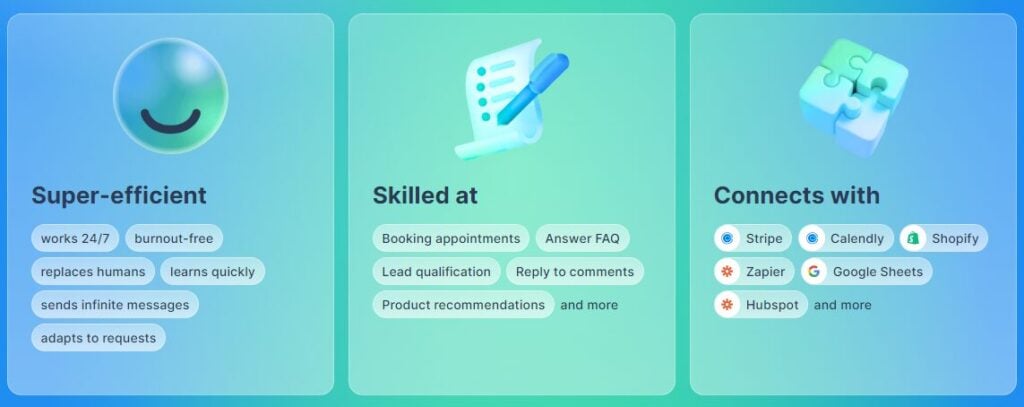
How to Implement AI Marketing Automation?
While it may seem like AI is all the hype everywhere, only 5.4% of the US businesses have started using it, according to the Census Bureau. In a report by GetResponse, over 500 marketers reported that AI tools were too complicated for them to implement, and over 300 said they didn't want to change the existing processes.
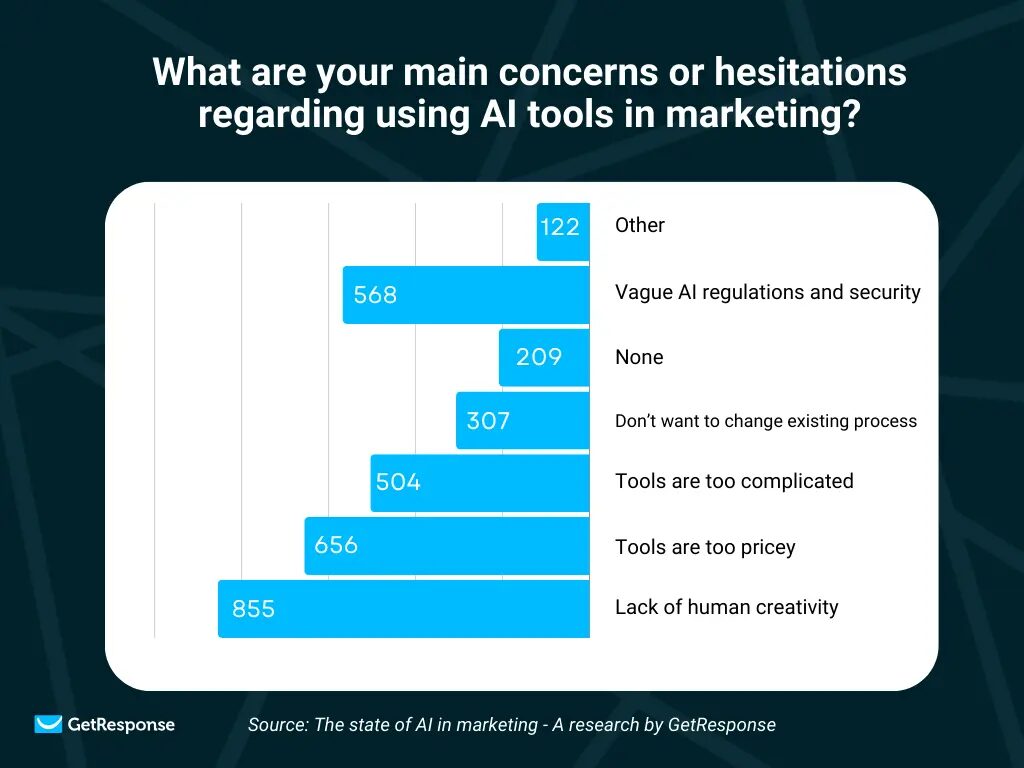
To go past these hesitations, it's important that you have a clear understanding of what AI marketing automation actually is and how to implement it effectively. Here are some steps to help you get started.
Create a Roadmap for Success Implementation
Start by creating a plan for your AI implementation. Which marketing processes do you want to automate? Which tools will you use? How will you use them?
You also need to decide the human-to-AI ratio of your marketing strategies. Include a detailed plan for how the technology will be integrated into your existing marketing processes, as well as a plan for training and reskilling your marketing team.
Train and Reskill Your Marketing Team
In a report by Authority Hacker, 45.2% (the majority) of marketers said that lack of knowledge for effective use was the top factor hindering AI adoption. Any business planning to implement AI in marketing should reskill their team.
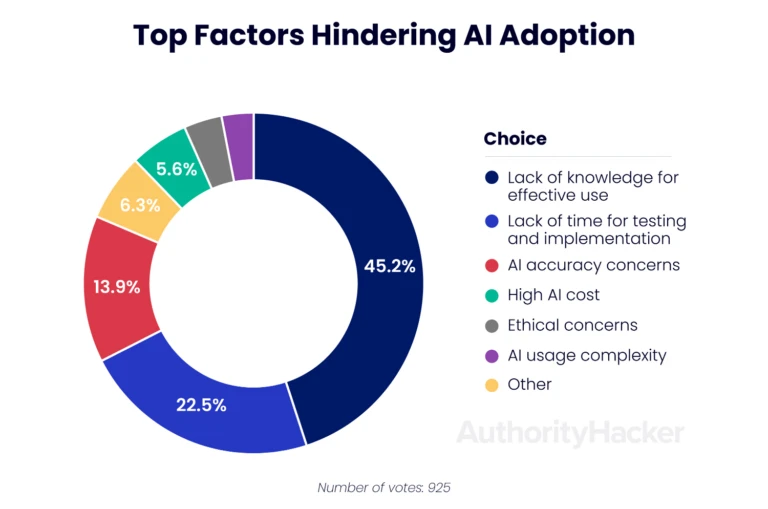
Here's how:
- Identify knowledge gaps: Assess the current skill set of your marketing team and identify areas where they may be lacking the necessary expertise to work with AI. A skills audit can help gauge what's missing.
- Provide relevant training: Then, provide relevant training such as social media marketing courses, workshops, or online resources to address the knowledge gaps.
- Encourage hands-on experience: Provide opportunities for your team to practice using the new tools and platforms in a safe environment. For example, you can set up a sandbox environment where they can experiment with AI-powered tools without the fear of making mistakes that could affect your business.
- Foster a culture of continuous learning: Encourage your team members to stay up-to-date with the latest trends and technologies and provide opportunities for ongoing training and development.
- Consider hiring new talent: In some cases, it may be necessary to bring in new talent to complement your existing team and fill any skill gaps. Look for candidates with experience working with AI and marketing automation and who have a track record of success in implementing these technologies.

Steps to reskill your marketing team
If you need extra assistance, you can hire a consultant or outsource certain tasks to experts in the field.
Optimize Over Time
Once your AI-powered marketing campaigns are up and running, optimize them periodically. You can use data analytics to identify areas for improvement and make necessary adjustments.
What Are the Emerging Trends and Advancements in AI Marketing Automation?
As AI advances, marketers can expect to see newer and better tools for automating their campaigns. Here are some emerging trends to keep your eye on.
- Ad targeting refinement: With Google and other search engines incorporating AI into their ad platforms, marketers can expect more precise targeting capabilities. AI-powered algorithms will help marketers choose the right place, the right time, and even the right copy or visuals for their ads. An example is Wordstream's Google Ads Grader, which audits your ad account and suggests improvements.
- Highly capable chatbots: As of 2023, there have been significant investments in conversation AI startups, which means that chatbots will become even more sophisticated. They will be able to handle complex tasks, such as processing payments or placing orders.
- Widespread predictive analysis: AI predictive analysis is expected to get even better, helping companies forecast sales and make better decisions.
- Use of multimodal AI: Multimodal AI, a combination of different AI models, will become even more mainstream. A good example is generative AI tools that can create both text and visuals instead of simply text or visuals. The penetration of generative AI has already gotten to a point where 63% of marketers believe that most content will be created using it in the future, and 81% say that the content it creates is the same or better than human-created content. In the future, we can expect to see more advanced versions of multimodal AI with even more capabilities.
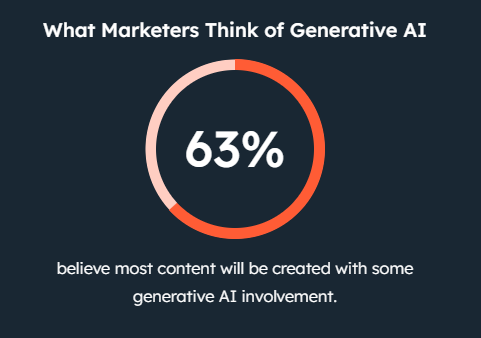
Overall, these emerging trends and advancements in AI-powered marketing automation have the potential to revolutionize the way marketing is done, and marketers who are aware of these trends and embrace them will be better positioned to stay ahead of the curve.
Conclusion
Summing up, AI marketing automation is the way forward for businesses that want to stay abreast in this highly competitive landscape. Besides improving personalization and customer satisfaction, AI-backed marketing can increase a company's revenue and competitiveness.
Above, we have also discussed some advancements and trends that the AI space will likely witness in the near future. These advancements will further enhance the capabilities of AI-powered marketing automation and help businesses thrive.
However, that's not to say that AI alone is the future. The need and demand for marketers is still there, as a hybrid of the two — human and AI collaboration — is what will drive success.
Frequently Asked Questions
What is AI marketing automation?
AI marketing automation is a term used to describe the application of artificial intelligence (AI) technologies used in a variety of settings related to marketing. This includes using AI-powered algorithms and data analysis techniques to automate tasks like ad targeting and segmentation, predictive analytics, conversational marketing, augmented reality and virtual reality experiences, among many others.
How can AI be used in marketing?
AI algorithms can be used to automate a variety of tasks related to marketing that would otherwise require a manual effort. From optimizing ad targeting and segmentation, engaging in personalized conversations with customers in real-time, to predicting customer behavior and preferences, marketers can save time, increase efficiency and make more informed decisions when it comes to their marketing strategies.
What are the benefits of AI marketing automation?
The primary benefit of leveraging AI for marketing automation is improved efficiency and a higher ROI. AI can help marketers optimize their strategies in a way that was not previously possible. Additionally, AI can help to increase customer engagement by providing a more personalized and immersive experience. The use of AI in marketing automation also presents new opportunities for those with the right skills and knowledge necessary to leverage the latest technologies.
What should organizations do to stay ahead of the curve and embrace AI marketing automation?
Organizations should invest in the necessary technology, training, and resources to empower their marketing teams to leverage AI marketing automation. This means having a good understanding of AI-based algorithms and data analysis techniques, and a willingness to explore new technologies. Organizations should also prioritize learning opportunities for their marketing teams in order to ensure they have the right skills and knowledge necessary to stay ahead of the curve.


